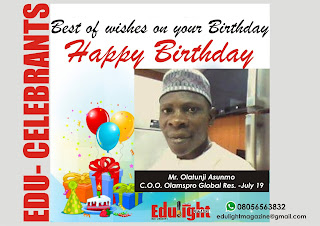Babatunde Raji Fashola, SAN (Yoruba:
Babátúndé Rájí Fáshọlá; born 28 June, 1963) is a Nigerian lawyer and politician
who is currently the Federal Minister of Power, Works and Housing and was Lagos
State Governor from May 29, 2007 to May 29, 2015.
Babatunde Raji Fashola of Yoruba origin,
from Lagos, was born in Lagos on 28 June, 1963. He attended Birch Freeman High
school Lagos and Igbobi College Lagos. He studied Law at the University of
Benin from where he graduated with a Bachelor of Laws, LL.B.(Hon), degree in
1987.
As a candidate of the Action Congress
party, now known as the All Progressives Congress, Fashola succeeded Bola Ahmed
Tinubu, on 14 April, 2007, and was sworn in on 29 May, 2007. Fashola was
re-elected on 26 April, 2011. On November 11th 2015, he was appointed by
President Muhammadu Buhari to be the Minister of Power, Works and Housing.
Fashola up till date is considered by many as one of the most successful
governors in Lagos state.
He was called to the Nigerian Bar as a
solicitor and advocate of the Supreme Court of Nigeria in November 1988 after
completing the professional training programme at the Nigerian Law School,
Lagos which he undertook between 1987 and 1988. His legal career of over one
and a half decades, commenced in the law Firm of Sofunde, Osakwe, Ogundipe and
Belgore, where he cut his legal teeth as a litigator over such wide-ranging
areas of specialisation as, intellectual property (registration of trade
marks), commercial law, covering general contracts, company activities,
mergers, acquisitions, right issues, ownership of shares and equity of
corporations, as well as land disputes, criminal law and chieftaincy matters,
in all of which he has come to acquire appreciable expertise and vast
experience.
Fashola, a Notary Public of the Supreme
Court of Nigeria, has been variously honoured with awards and certificates of
merit including the Distinguished Alumnus Award conferred on him by the
University of Benin Alumni Association in recognition of contributions to the
Alumnus association and humanity. He is also a recipient of Lagos State public
service club Platinum Award for outstanding contribution towards development.
As well as Alliance for Democracy "Igbogbo Bayeku Local Government
Award" in recognition of activities towards the success of the party.
Babatunde Fashola is also a Patron of the
Law Students Association of the University of Benin and he is the second law
graduate from the University of Benin and the first member of the Nigerian Law
School graduating class of 1988 to be conferred with the professional rank of
Senior Advocate of Nigeria. Fashola is also the First ever Chief of Staff to be
so honoured. Babatunde Fashola is a member of the Nigerian Bar Association, the
International Bar Association and an Associate of the Chartered Institute of
Taxation of Nigeria.
Babatunde Raji Fashola commenced a
four-year tenure as the Executive Governor of Lagos State in Nigeria on 29 May
2007. In June 2007, Babatunde Fashola appointed former Inspector General of
Police Musiliu Smith head of the Lagos State Security council, a body charged
with taking a holistic look at the anatomy of crime in the state. The Babatunde
Fashola Good Governance Group (G3) movement is a good example of Fashola's
commitment to reaching out to the people using various media channels.






























